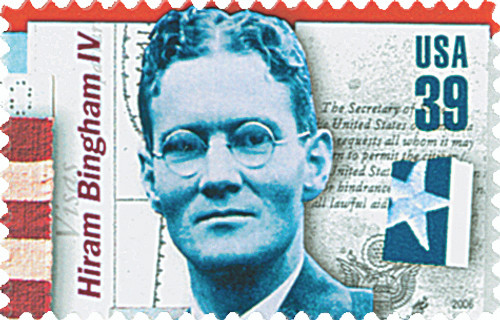
# 4076a - 2006 39c American Diplomats: Robert D. Murphy
Distinguished American Diplomats
City: Washington, DC
Printed by: Avery Dennison
Printing method: Photogravure
Perforations: Die cut 10 ¾
Color: Multicolored
Birth of Robert D. Murphy
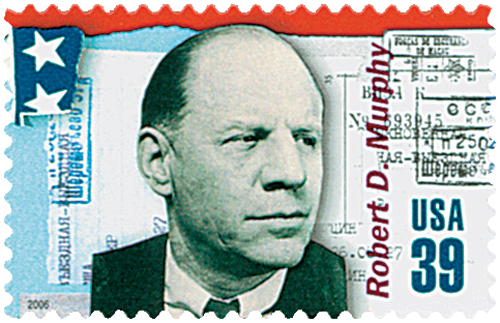
Robert Daniel Murphy was born on October 28, 1894, in Milwaukee, Wisconsin. He was an accomplished American diplomat who helped plan the Allied landings in North Africa during World War II.
Murphy attended Marquette University. He suffered a severe foot injury that prevented him from joining the military during World War I. He worked in a post office for a time and then went to Bern, Switzerland, to work as a cipher clerk at the American Legion.

Murphy was admitted to the US Foreign Service in 1921. He served in several posts in the coming years including vice-consul in Zurich and Munich, and consul in Seville and Paris. When the Germans invaded Paris, Murphy was made chargé d’affaires to the French Vichy government. This new government was allowed to keep about 150,00 troops in Tunisia, Morocco, and Algeria. Murphy traveled to Algiers to negotiate the Murphy-Weyand Agreement, which allowed the US to ship to French North Africa where the British had set up a blockade and imposed trade restrictions.
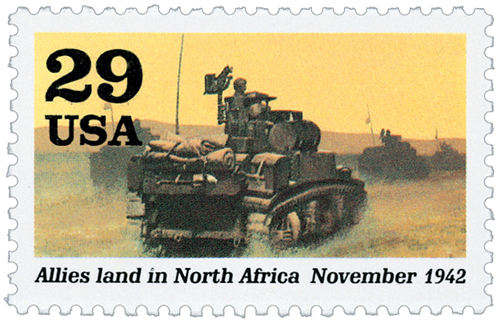
Then in 1942, Murphy was made minister to French North Africa. He spent a considerable amount of time visiting Algeria, Morocco, and Tunisia, meeting with French military leaders to see if they would aid the Allies. Murphy was preparing for Operation Torch, the Allied landings in French North Africa, and the first large-scale Western Allied ground offensive of the war. The operation was a success, with the Allies taking control of French West Africa, Morocco, and Algeria.
Murphy attended the Casablanca Conference in January 1943 and was then sent to Italy. There he would be the civilian representative of the president and State Department, and he carried a personal message from President Franklin Roosevelt to Pope Pius XII. Murphy then participated in negotiations with Yugoslavia. Next, Murphy was made General Dwight Eisenhower’s chief adviser on German affairs, helping to plan the occupation of Germany.
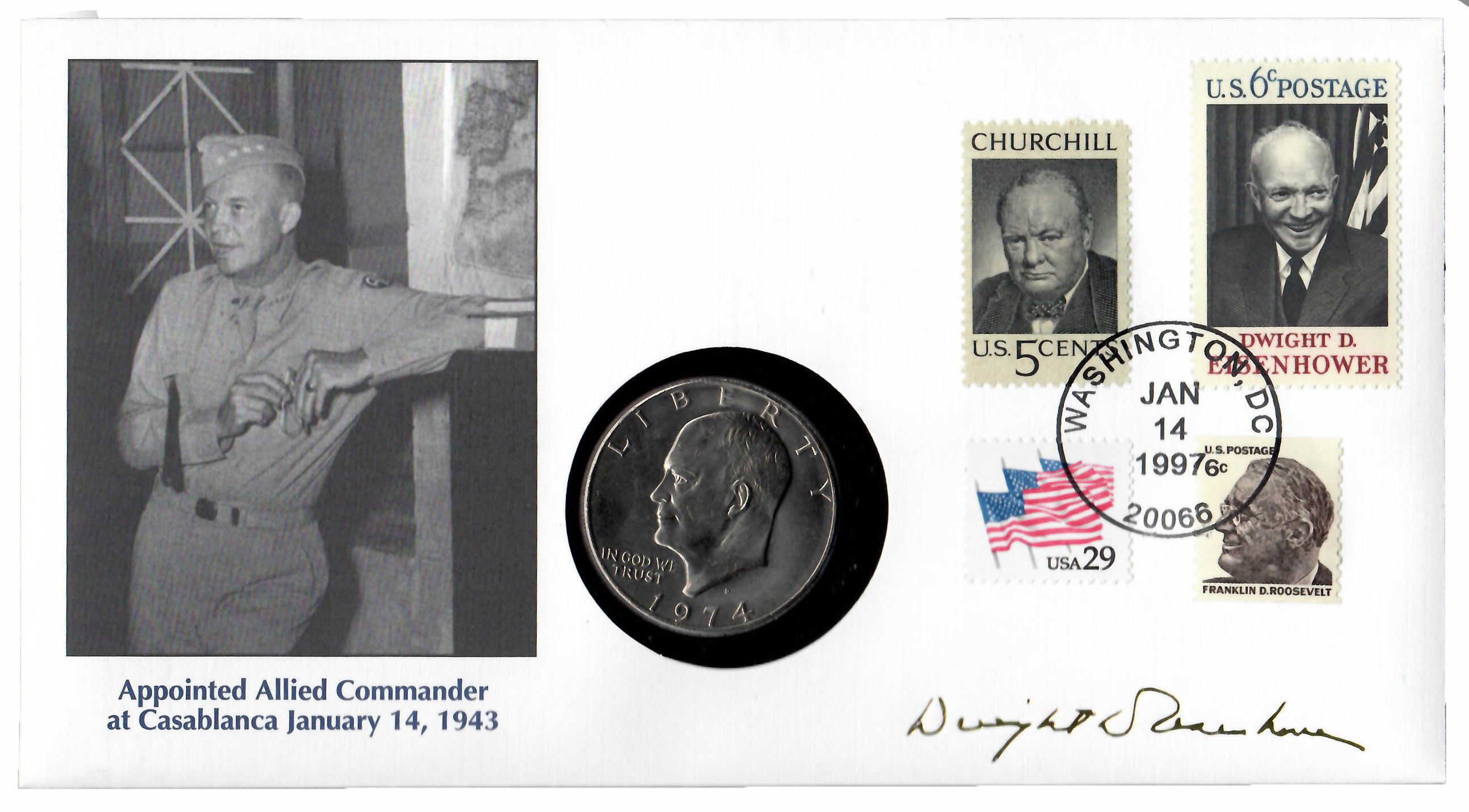
Murphy was later the only member of the American Military Government to be part of the US delegation at the Potsdam Conference in July 1945. After the war, Murphy was made ambassador to Belgium. Then in 1952, he became the first postwar ambassador to Japan. In that role he represented the US as Japan became an American supply depot for the Korean War. Murphy carried out diplomatic missions in Korea and Taiwan before being appointed under secretary of State for political affairs. He later recalled, “The work was grueling, but it concerned the entire sweep of American foreign policy and diplomacy and it provided my most satisfying years.”

In 1953, Murphy served as assistant secretary for United Nations Affairs and in 1956 he was made a career ambassador, a special rank bestowed by the president “in recognition of especially distinguished service over a sustained period.” Murphy participated in negotiations during the 1956 Suez Canal Crisis as well as “good office” missions to alleviate tensions between France and Tunisia. Murphy was also present when 7,000 US Marines landed in Beirut, Lebanon.
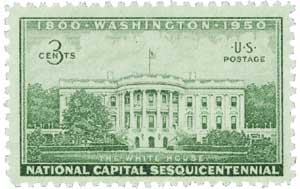
Murphy retired from the State Department in 1959, but served as an advisor to presidents John F. Kennedy, Lyndon B. Johnson, and Richard Nixon. In 1976, Gerald Ford tasked Murphy with heading an oversight board for the CIA. In his retirement, Murphy also wrote his memoirs and worked with Corning Glass Works. Murphy died on January 9, 1978. Among the many honors he received during his life were a Distinguished Service Medal and several foreign honors including the French Croix de Guerre.
Distinguished American Diplomats
City: Washington, DC
Printed by: Avery Dennison
Printing method: Photogravure
Perforations: Die cut 10 ¾
Color: Multicolored
Birth of Robert D. Murphy

Robert Daniel Murphy was born on October 28, 1894, in Milwaukee, Wisconsin. He was an accomplished American diplomat who helped plan the Allied landings in North Africa during World War II.
Murphy attended Marquette University. He suffered a severe foot injury that prevented him from joining the military during World War I. He worked in a post office for a time and then went to Bern, Switzerland, to work as a cipher clerk at the American Legion.

Murphy was admitted to the US Foreign Service in 1921. He served in several posts in the coming years including vice-consul in Zurich and Munich, and consul in Seville and Paris. When the Germans invaded Paris, Murphy was made chargé d’affaires to the French Vichy government. This new government was allowed to keep about 150,00 troops in Tunisia, Morocco, and Algeria. Murphy traveled to Algiers to negotiate the Murphy-Weyand Agreement, which allowed the US to ship to French North Africa where the British had set up a blockade and imposed trade restrictions.

Then in 1942, Murphy was made minister to French North Africa. He spent a considerable amount of time visiting Algeria, Morocco, and Tunisia, meeting with French military leaders to see if they would aid the Allies. Murphy was preparing for Operation Torch, the Allied landings in French North Africa, and the first large-scale Western Allied ground offensive of the war. The operation was a success, with the Allies taking control of French West Africa, Morocco, and Algeria.
Murphy attended the Casablanca Conference in January 1943 and was then sent to Italy. There he would be the civilian representative of the president and State Department, and he carried a personal message from President Franklin Roosevelt to Pope Pius XII. Murphy then participated in negotiations with Yugoslavia. Next, Murphy was made General Dwight Eisenhower’s chief adviser on German affairs, helping to plan the occupation of Germany.

Murphy was later the only member of the American Military Government to be part of the US delegation at the Potsdam Conference in July 1945. After the war, Murphy was made ambassador to Belgium. Then in 1952, he became the first postwar ambassador to Japan. In that role he represented the US as Japan became an American supply depot for the Korean War. Murphy carried out diplomatic missions in Korea and Taiwan before being appointed under secretary of State for political affairs. He later recalled, “The work was grueling, but it concerned the entire sweep of American foreign policy and diplomacy and it provided my most satisfying years.”

In 1953, Murphy served as assistant secretary for United Nations Affairs and in 1956 he was made a career ambassador, a special rank bestowed by the president “in recognition of especially distinguished service over a sustained period.” Murphy participated in negotiations during the 1956 Suez Canal Crisis as well as “good office” missions to alleviate tensions between France and Tunisia. Murphy was also present when 7,000 US Marines landed in Beirut, Lebanon.

Murphy retired from the State Department in 1959, but served as an advisor to presidents John F. Kennedy, Lyndon B. Johnson, and Richard Nixon. In 1976, Gerald Ford tasked Murphy with heading an oversight board for the CIA. In his retirement, Murphy also wrote his memoirs and worked with Corning Glass Works. Murphy died on January 9, 1978. Among the many honors he received during his life were a Distinguished Service Medal and several foreign honors including the French Croix de Guerre.






